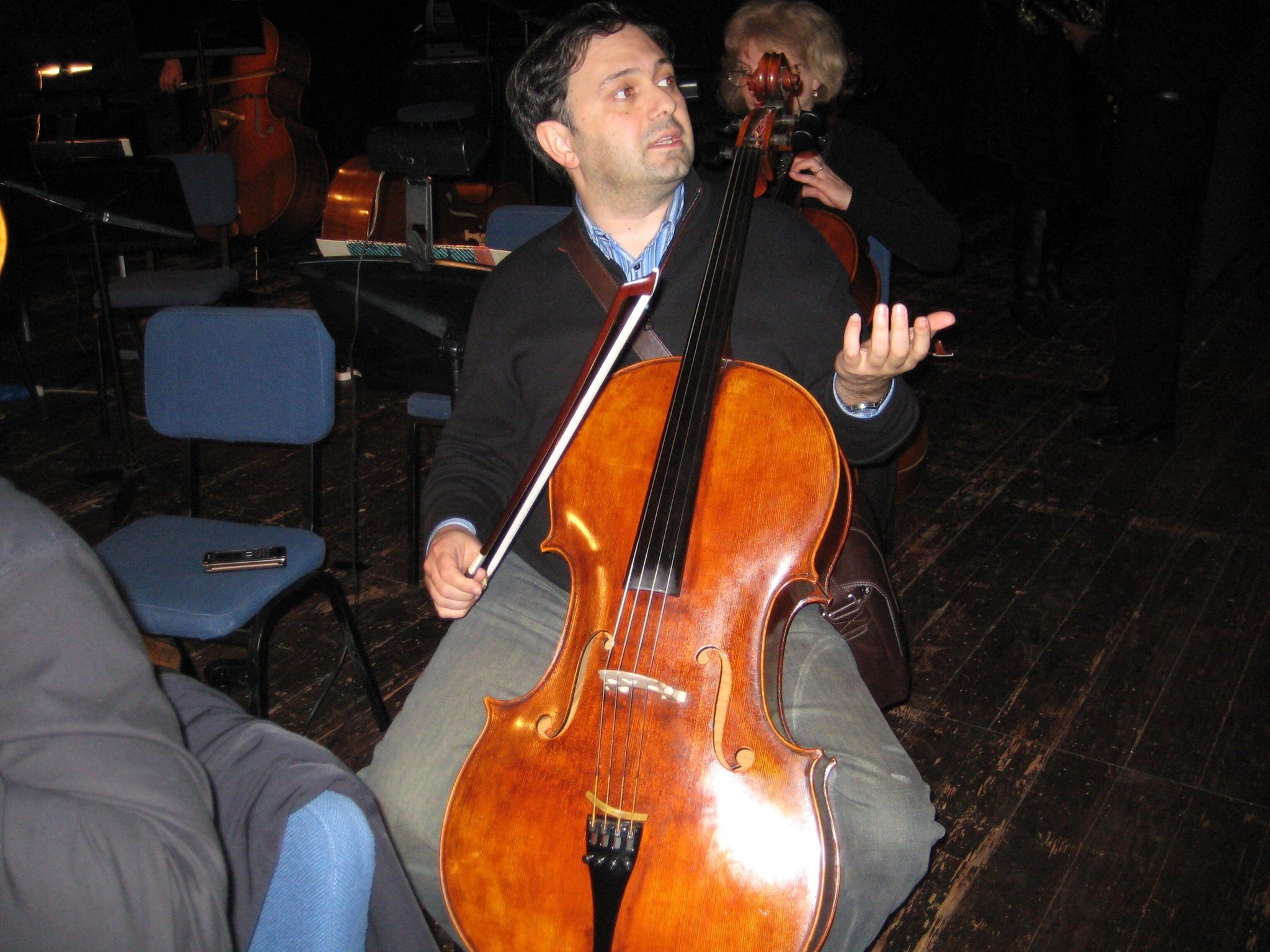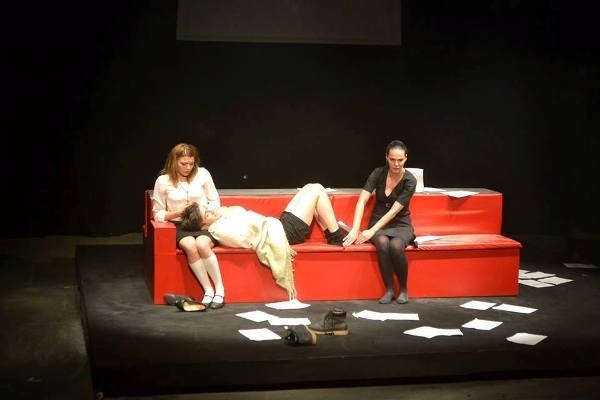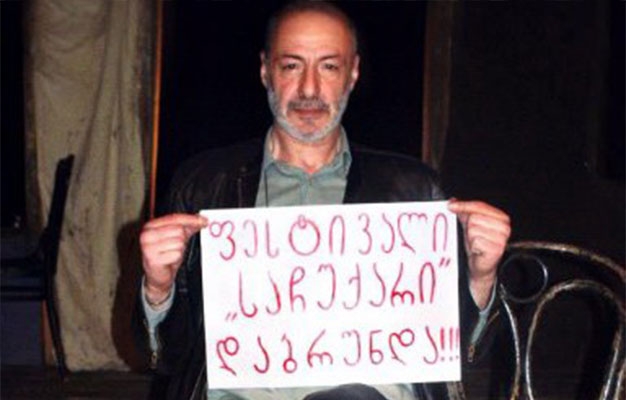Temur Chkheidze’s plays routinely receive standing ovations at the St. Petersburg Big Drama Theatre in Russia. Likewise, the respect and admiration he receives is never lacking when he stages plays at Georgia’s Rustaveli and Marjanishvili Theatres– not even today, despite the fact that he comes to Tbilisi only once or twice per year.
Chkheidze is very taciturn. However, the distinguished director does enjoy discussing the theatre, plays, actors and the topic of drama in general; and he will do this with pleasure. While he was in Tbilisi staging Friedrich Schiller’s Mary Stuart at the Marjanishvili Theatre this spring, we were able to catch up with the esteemed director and ask him some interesting questions about his work
The romantic dramatist Friedrich Schiller often appears in your works. Do you think that romantic drama is always modern?
Let me ask you something: why do you think Love and Treachery was part of the Big Drama Theatre’s program for more than fifteen-years? And commanding a full house every time..? And it was removed from the program on my personal request? Now we play Mary Stuart and Don Carlos. You are right – the present time is not so romantic anymore, but there lives a romantic soul in each of us. And tell me, who does not dream of a real love? The desire to love is romanticism in itself.
In my Schiller plays the actors do not live like 18th century actors; romanticist styles have become out-dated, but not romanticism itself. Love is everywhere. What is Antigone about? For example, Antigone and Creon are crazy for each other.
You truly pamper the Georgian audience- despite you working so far away. Almost every year you come to Georgia and stage your new plays. Why is that? Is it nostalgia?
If we do not count the Big Drama Theatre, the Marjanishvili Theatre, just like all of Georgia, is my home. In recent years I have been staging plays at the Marjanishvili Theatre only. I love the Georgian audience.
You have been working at the St. Petersburg Big Drama Theatre for more than twenty-years. How did they accept a new director, how did you adapt to the new cast and vice-versa… How did the cast receive you?
In 1990, I staged my first play at the St. Petersburg Drama Theatre. I was working at the Marjanishvili Theatre simultaneously and at that time, did not plan to move to St. Petersburg. When I began rehearsals at the theatre, within a week’s time I already felt that I had been working there for years. It happened very unexpectedly. If it did not happen, I would have been a guest of the theatre, would have finished the play and come back to Georgia... But it felt like I had been working with these actors my whole life. In my opinion, it is because my teacher was Mikheil Tumanishvili, and his teacher was Giorgi Tovstonogov, who founded the theatre; the theatre still carries his name.
After Giorgi Tovstonogov’s death in 1989, the theatre selected me. At first I was the chief director, and after Kiril Lavrov via a secret ballot, I was chosen as the art-director. It was my condition: I wished to know how many members had voted for me. If I had received the votes of only 51 of the cast members, I would not have accepted the job. How reasonable is it when half of the troupe is against you? Because the voting results turned out to be agreeable, I decided to accept the position.
At the Theatrical Institute, Temur Chkheidze was a student in a class taught by two distinguished directors – Dodo Aleksidze and Mikheil Tumanishvili. It was a unique situation. There was Dodo Aleksidze, a master of festivities and comedies, and a director who possessed a style that was very heroic and romantic in nature. Then there was Mikheil Tumanishvili, a man raised on art-theatre traditions, an admirer of the Marjanishvili Theatre, an adherent to Stanislavky’s system, and one of the founders of psychological theatre in Georgia.
These two differed greatly from one another in both character and temperament. Dodo Aleksidze was always joyful, a creator and teller of jokes and funny stories, and possessed a romantic spirit. Mikheil Tumanishvili, on the other hand, was very serious, reserved, taciturn, strict and demanding. After studying under the tutelidge of both directors, Temur Chkheidze finished the school acquiring and retaining the best features from both of them.
Temur Chkheidze:
I stage psychological plays. I try to get the most out of the minimum. In these plays I attempt to express the anatomy of human nature. If I were a painter, I would have been a portrait-painter. I am interested in every process taking place within the human soul. In theatre, everything should be psychologically justified… Everything should be ordered according to life. As in life, some very unexpected things might occur in the process.
Your mother, Medea Chakhava, was a famous Georgian actress. How could you put aside your family association when working with her as an actress?
I really can do it. She played roles in three of my plays. These included the dramatization of Davit Kldiashvili’s Samanishvili’s Stepmother, Shalva Dadiani’s Gushindelni (People of Yesterday) and Federico Garcia Lorca’s The House of Bernarda Alba. She took these roles while she was younger; when she was a leading actress at the Rustaveli Academic Theatre… she was an excellent actress!
Mr. Temur, what does an actor mean to you?
An actor is my instrument. I hope they will not get offended when I say that. I like when the whole feeling on the stage shows that everything was done by an actor. When an actor comes out on the stage, I must see the anatomy of their soul… I must feel it. In that moment “the trepanation of the actor’s scalp” should take place.
Let’s talk about Mary Stuart. A play that you presented at the Marjanishvili Theatre in spring...
It is a play about strong people. Elizabeth is one of the greatest rulers of England. Her wisdom is underscored by how clever and strong her council is, and the people around her are. Elizabeth listens to their disputes and then makes her conclusions – which are often correct but not always, as she is human and humans tend to make mistakes.
Mr. Temur, people often debate whether there needs to be a plot in the play. How important is this?
The plot is necessary. There is no theatre without it! I go to the theatre to see how the plot – already known to me – is interpreted and retold. The most important aspect in theatre is how you tell what is already written.
Not sure anyone will know what this means? I have no idea what he is talking about here.

The forthcoming seminar for Georgian young theatre critics
25-March-2015, 10:17


Phantoms
15-December-2013, 23:24

Festival, festival…
09-November-2013, 13:51


